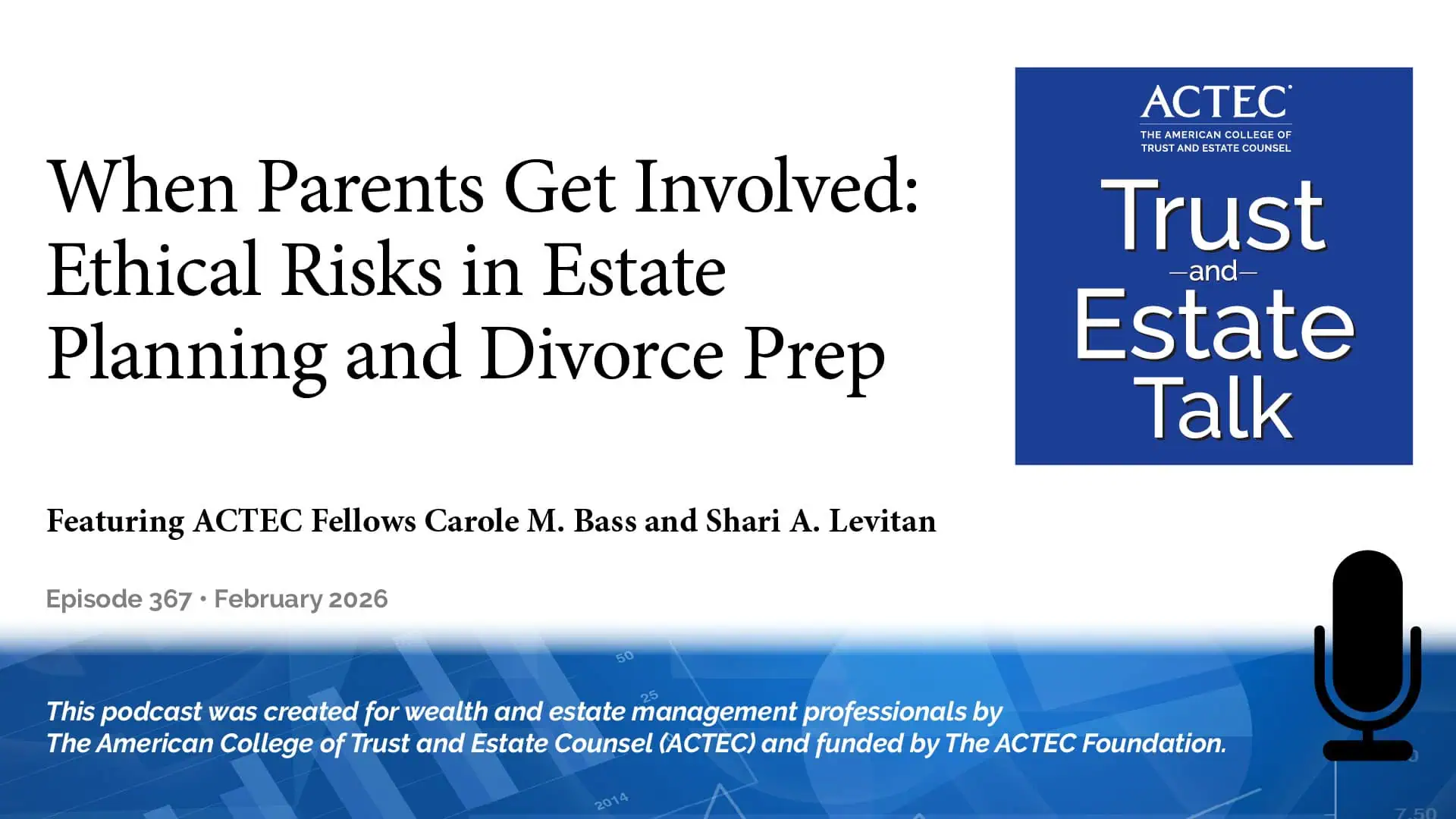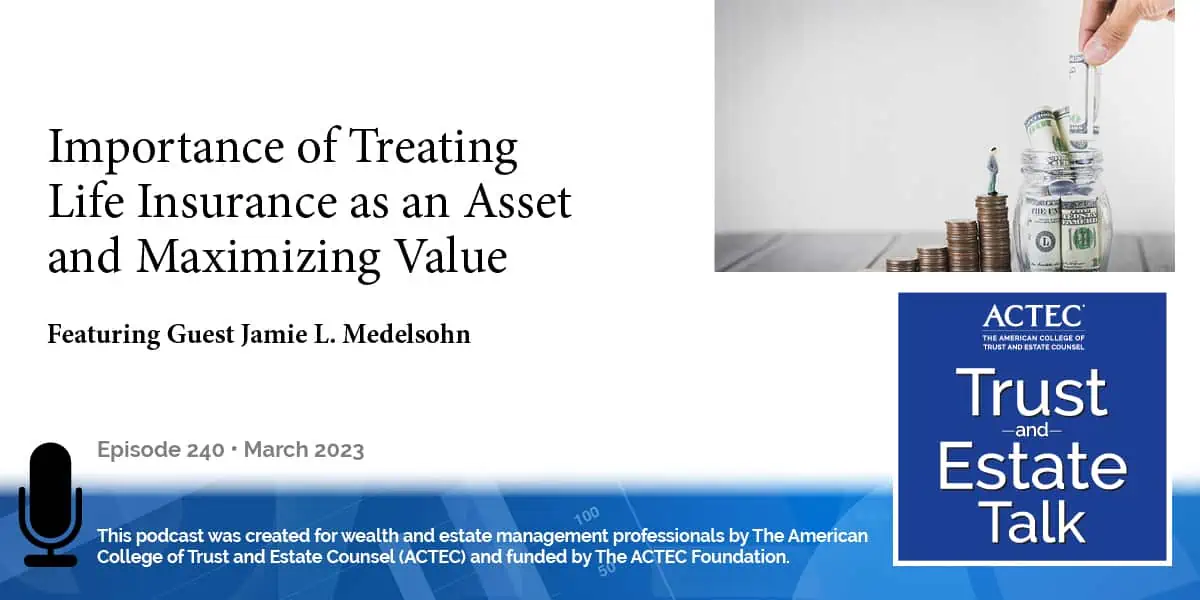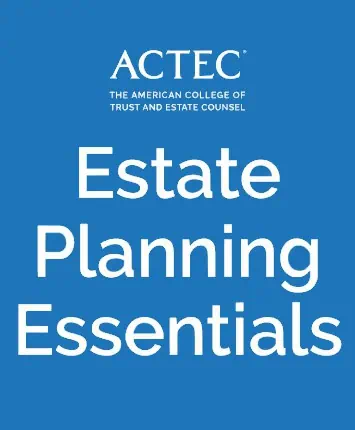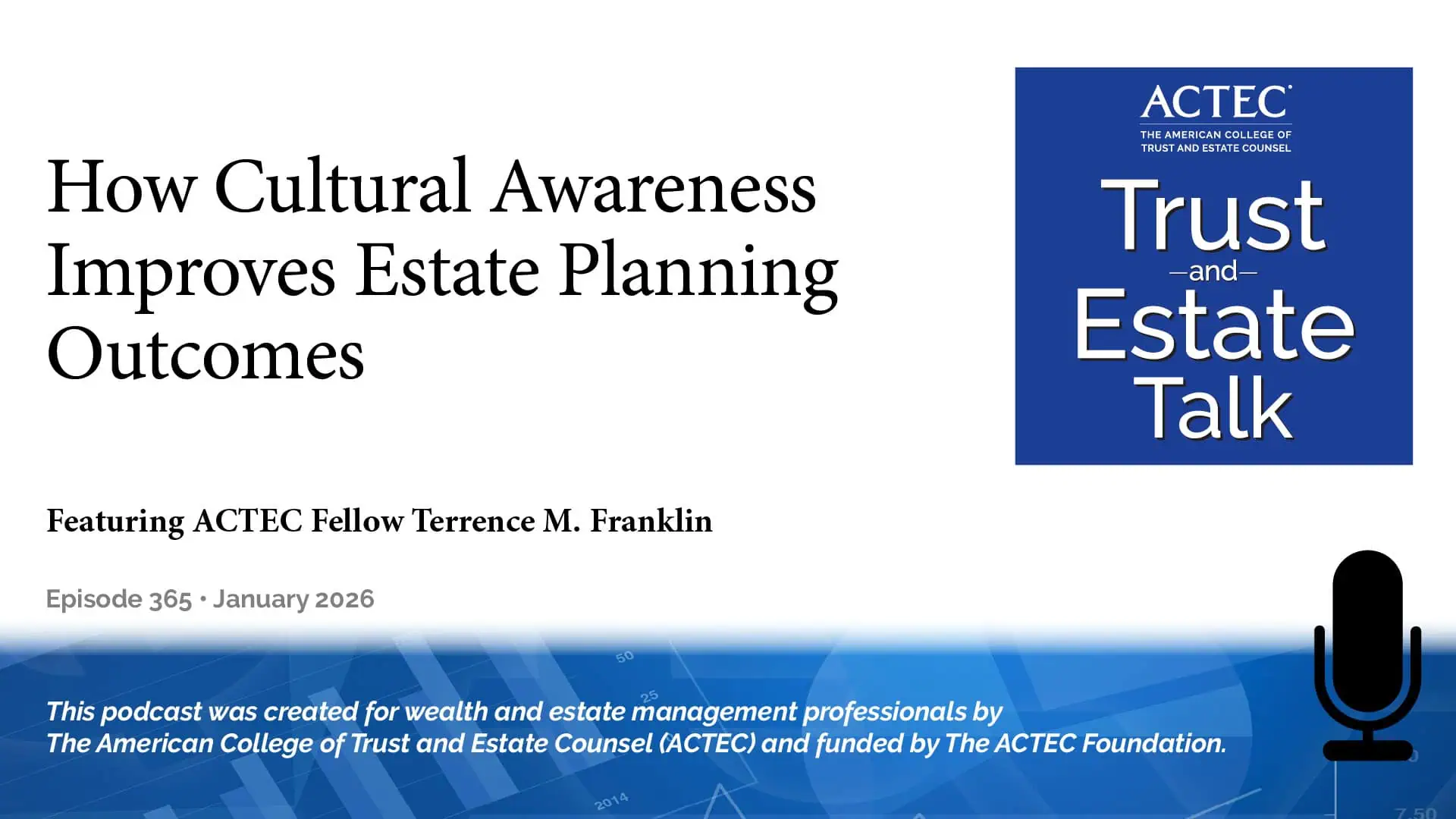The Importance of Treating Life Insurance as an Asset and Maximizing Value
“The Importance of Treating Life Insurance as an Asset and Maximizing Value,” that’s the subject of today’s ACTEC Trust and Estate Talk.
Transcript/Show Notes
This is Travis Hayes, ACTEC Fellow from Naples, Florida. Although life insurance is a mainstay in estate planning and often the most valuable asset a client owns, some fail to understand the value or opportunity of their policy outside of the death benefit. It’s important to understand how to identify opportunities to maximize the policy’s value and create the funds needed for other estate planning needs, like long-term care, medical costs, and retirement. Jamie Mendelsohn of the Ashar Group in Orlando, Florida, joins us today to tell us more. Welcome, Jamie.
It’s a pleasure to be here. Life insurance can be the largest unmanaged asset that a client owns, and it is rarely appraised or valued. For today’s discussion, one of the biggest takeaways I hope you have is the importance of treating life insurance as an asset, similar to how you treat other ordinary properties that your clients own. There is a regulated institutional marketplace that will purchase existing life insurance policies. Recognizing that your clients’ life insurance assets have other exit strategies than just surrender or lapse, can have significant value and have the opportunity to create six or seven figures for other planning needs.
A life settlement, by definition, is the sale of an existing life insurance policy for an amount greater than the surrender value but less than the death benefit. Before your clients ever surrender or lapse a policy or materially change it, the importance of valuing that asset,understanding what it’s worth, so then you can inform the client and make a decision on what to do with it can be powerful. The life settlement marketplace that exists today is highly regulated, has institutional buyers, private equity hedge funds, and pension funds that will purchase existing life insurance policies, usually on retirement age clients.
Life Insurance as an Asset
This discussion today about the importance of valuing life insurance is likely most relevant to your clients over the age of 70 with universal life products or convertible term to universal life. The regulated marketplace will purchase base amounts of all sizes. As small as $100,000 estate to as large as $100,000,000 estate. So, the life settlement marketplace could help create capital or opportunities with your client to help fund other planning needs or wants. Again, one of the biggest takeaways from the discussion today is to treat life insurance like you treat other ordinary property.
Your clients would never walk away from a piece of real estate without understanding the value. You would never have a piece of real estate sitting in a trust without understanding the value. But how many of your clients have existing life insurance policies? They make a decision that they can no longer want, need, or can afford it, and they just simply walk away from it. They hand it back to the carrier, or they lapse it. By going through the valuation process and understanding the value of that life insurance policy, it can help create opportunities with your clients as well as mitigate risk and liability for your firm.
The marketplace today is available to 100% of the population. There are departments of insurance and financial services that regulate the transaction. There are IRS Revenue Rulings that determine the liability of the sale. And the marketplace today, the largest institutional capital sources that are investing in other asset classes are investing in the life settlement marketplace. The opportunity to help clients recognize that their life insurance policies could have significant value is very important. It gives clients choices. The opportunity to take a policy and monetize it today to help fund long-term care needs or retirement needs. We’ve worked on a $500,000 policy that has very little surrender value on a 92-year-old.
Instead of that client just surrendering that policy because it was unaffordable, for only $12,000, that policy was sold in the life settlement marketplace for over $200,000. What an opportunity to create liquidity for your clients’ planning needs. Additionally, if you have clients that are trying to unwind some of their complex structures, whether that be premium finance, inter-family loans, or split-dollar arrangements. Before they just surrender those policies or exit those policies, understanding the value of the life settlement marketplace potentially being an exit strategy for those policies could create surplus liquidity to help fund other planning needs.
Educating Clients on the Value of Life Insurance
There’s an opportunity with your clients to help educate them and recognize that life insurance can be a valuable asset as their need for it changes. They sold a company. They’ve lost a spouse. They’ve gifted out the majority of their wealth. Before they just surrender or lapse that policy, going through the valuation process, similar to how they would value their art or their jewelry, before discarding it, can lead to wonderful opportunities of generating capital to fund other needs they might have.
Understanding the marketplace is important. In the market, there are three main participants. You have the policy owners that actually own the policy. Then you have the life settlement brokers that are licensed nationally to have a fiduciary duty to the policy owner, and then you have the providers or buyers that are licensed to represent those investors I mentioned earlier. As a fiduciary for your client, ensuring that they have seller representation to be able to ensure a best practice, best interest approach to the marketplace is important. A simple question of ensuring they’re working with a party that is licensed to represent them can have powerful results. Just like if you had a hard-to-value asset that you might take to one of the auction houses, the Hindman, the Heritages, the Sotheby’s, the Christies, that value that hard-to-value asset. And then, based on that value, they would create the auction with the strongest bidders, domestic and international.
There is a marketplace for existing life insurance policies that list seller representation. There’s the opportunity to go to market, go to auction, and force competition between different buyers- these different institution capital sources- to deliver the greatest results.
Key Takeaways to Valuing and Selling a Life Insurance Policy
So, again, recognize the importance of valuing life insurance before your client surrenders or lapses. Recognizing that there are three main participants – the owner, the broker (that’s the seller representative), and the provider that represents the institution and the importance of the auction can lead to creating significant value for your policy owners. Also, the importance of valuing life insurance for documentation purposes and recognizing that instead of relying fully on the carrier’s IPR value or 712 value, recognizing there are alternative methodologies that exist, but there’s a marketplace of willing buyers and willing sellers can also be impactful for planning.
When we think about life insurance and our legal and ethical responsibility to our policy owners and our clients, just incorporate this discussion—asking the simple question, when was the last time your life insurance was appraised or valued? Mak=ing sure if they come to you with a transaction you ask the question: who represented you? Did you have seller representation and was there an option that can lead to the opportunity of ensuring your clients aren’t missing out on six or seven figures of value for their life insurance assets before they exit them? Thank you so much for your time today.
Thank you, Jamie, for reminding us of the importance of treating life insurance as a valuable asset and maximizing a policy’s value.
You may also be interested in:
- Understanding Life Insurance Policy Ownership (Jan 2022)
- Life Insurance Policies and Estate Planning (Dec 2021)
This podcast was produced by The American College of Trust and Estate Counsel, ACTEC. Listeners, including professionals, should under no circumstances rely upon this information as a substitute for their own research or for obtaining specific legal or tax advice from their own counsel. The material in this podcast is for information purposes only and is not intended to and should not be treated as legal advice or tax advice. The views expressed are those of speakers as of the date noted and not necessarily those of ACTEC or any speaker’s employer or firm. The information, opinions, and recommendations presented in this Podcast are for general information only and any reliance on the information provided in this Podcast is done at your own risk. The entire contents and design of this Podcast, are the property of ACTEC, or used by ACTEC with permission, and are protected under U.S. and international copyright and trademark laws. Except as otherwise provided herein, users of this Podcast may save and use information contained in the Podcast only for personal or other non-commercial, educational purposes. No other use, including, without limitation, reproduction, retransmission or editing, of this Podcast may be made without the prior written permission of The American College of Trust and Estate Counsel.
If you have ideas for a future ACTEC Trust & Estate Talk topic, please contact us at ACTECpodcast@ACTEC.org.
© 2018 – 2026 The American College of Trust and Estate Counsel. All rights reserved.
Latest ACTEC Trust and Estate Talk Podcasts

Estate Planning Considerations in Community Property States Relating to Retirement Accounts
Explore how community property laws shape IRAs, 401(k)s, beneficiary designations, and spousal rights in retirement account estate planning.

When Parents Get Involved: Ethical Risks in Estate Planning and Divorce Prep
When parents join prenup or divorce planning, ethical risks follow. ACTEC Fellows explore privilege, conflicts, and protecting the attorney-client relationship.

Useful But Overlooked Trusts: A Planner’s Guide to When and How to Use Them
Explore overlooked trusts—including HEETs, alimony, voting, and blind trusts—and when estate planners should use them to address complex client needs.



